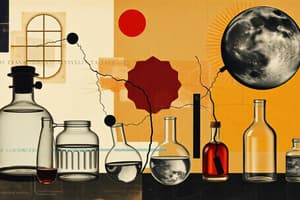Podcast
Questions and Answers
What should you do if a chemical gets in your eye?
What should you do if a chemical gets in your eye?
- Cover your eye with a cloth and continue working
- Flush it with running water for at least 15 minutes (correct)
- Close your eye and wait for the irritation to pass
- Rub your eye vigorously to remove the chemical
What should you do before pouring liquids into test tubes?
What should you do before pouring liquids into test tubes?
- Hold the test tubes in your hand
- Balance the test tubes on other lab equipment
- Place the test tubes on the edge of the table
- Put test tubes in a test tube rack (correct)
When can you remove your safety goggles in the lab?
When can you remove your safety goggles in the lab?
- After checking the labels on the chemicals
- Once your teacher leaves the lab
- When no one else is using chemicals
- As long as there are any chemicals being used (correct)
Why is it important to dry your hands when using electrical equipment?
Why is it important to dry your hands when using electrical equipment?
What should be done before beginning an experiment in the lab?
What should be done before beginning an experiment in the lab?
How can one avoid 'mix-ups' in the lab?
How can one avoid 'mix-ups' in the lab?
What should be used to tell the difference between hot and cool glass in the lab?
What should be used to tell the difference between hot and cool glass in the lab?
When lighting the burner in the lab, always turn on the gas ____________.
When lighting the burner in the lab, always turn on the gas ____________.
What should be done if an acid or base spill occurs on the skin or into the eyes?
What should be done if an acid or base spill occurs on the skin or into the eyes?
Flammable and volatile liquids are stored in ____________ in a science lab.
Flammable and volatile liquids are stored in ____________ in a science lab.
Flashcards are hidden until you start studying




